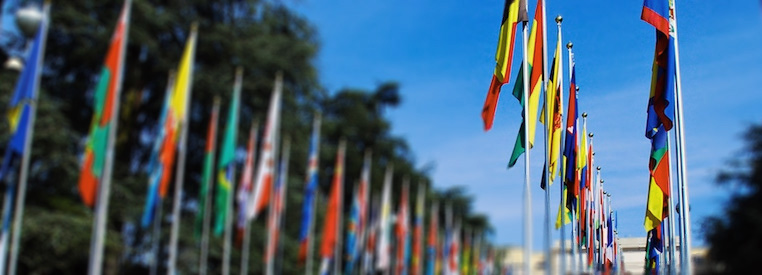On 21-22 May 2008, governmental representatives from 26 countries gathered in Reykjavik, Iceland, at the invitation of the Foreign Minister of Iceland, for the thirty-first annual colloquium on human rights policy.
Colloquium 2008 | Reykjavik, Iceland | Agenda
Skip to a section:
- The 60th anniversary of the Universal Declaration of Human Rights and 15 years after the World Conference in Vienna: Progress or backsliding?
- Review of the work of the Regular and Special Sessions of the Human Rights Council: Advances to encourage, missteps to correct
- Economic, social and cultural rights: Poverty and the role of business
- Terrorism: Human rights dimensions
Is the contemporary relevance of the UDHR under attack, and if so, what is behind the challenges and what is the appropriate response?
Notwithstanding the statement of the 2005 Summit that “the universal nature of these rights and freedoms is beyond question,” what are the current challenges to the universality of the UDHR and to what extent are they related to suspicion of human rights as being inimical to the promotion of pluralistic diversity, or cultural specificity, or free enterprise?
Considering that the General Assembly, in Resolution 62/171, proclaimed the year commencing on 10 December 2008 to be the International Year of Human Rights Learning, what activities could Member States undertake to give substance to this resolution, including preparation for the high-level plenary meeting to be held on 10 December 2008?
How should the follow-up to the VDPA be assessed in terms of met and unmet expectations 15 years on?
Is there a truth to the claim that the Council is worse than its predecessor Commission in terms of politicization, inefficiency, and weakening of potentially robust procedures of human rights accountability?
Are the Special Sessions helpful or harmful to the capacity of the Council to deal with urgent situations?
Are the guidelines and mechanisms set out in Decision 6/102 of September 2007 and the non-paper on Universal Periodic Review (UPR) (A/HRC/5/14 of 6 June 2007) realistic and useful and will they enable the Council to engage in a meaningful UPR exercise? What lessons may be drawn from the first session in April 2008? Has the Council been sufficiently attentive to drawing on NGOs and independent experts and what can be done to enhance the role of civil society?
What should be the priority concerns of the Council for the coming two years?
III. ECONOMIC, SOCIAL AND CULTURAL RIGHTS: POVERTY AND THE ROLE OF BUSINESS
Will the Open-ended Working Group on an optional protocol to the International Covenant on Economic, Social and Cultural Rights be able to complete its work within the two year extension of its mandate (agreed to by the Human Rights Council in June 2006), and is the draft contained in document A/HRC/8/WG 4/2 of 24 December 2007 satisfactory and deserving of support?
Can the Council provide a constructive approach to the question of human rights and corporate social responsibility in the context of the work of the Special Representative of the Secretary-General on the issue of human rights and transnational corporations and other business enterprises, and has he succeeded in resolving key methodological questions of human rights impact assessments (see A/HRC/4.74 of 5 February 2007)?
Is the mandate of the independent expert on the question of human rights and extreme poverty useful and is his approach to applying the notion of extreme poverty within a human rights framework with respect to different country experiences in carrying out their anti-poverty programs (A/HRC/5/3 May 2007) deserving of support?
How can governments help bridge the gap between economic studies and the realization of ESCR, such as Paul Collier’s The Bottom Billion, Stephen Smith’s Ending Global Poverty, Joseph Stiglitz’s Globalization and its Discontents. or Jeffrey Sach’s The End of Poverty, which deal directly with the problems of deprivation of ESCR but almost never with human rights as such?
What are the prospects for implementation of the recommendation of Special Rapporteur on the promotion and protection of human rights and fundamental freedoms while countering terrorism? Is there a basis for his claim that the Human Rights Council provides inadequate resources and takes no action on his recommendations (Statement of 13 December 2007)?
Have recent efforts by governments to strike a balance between national security and human rights resulted in lowering the standards for all countries, thereby setting a dangerous precedent?
Should the international community accept the notion of a “war on terrorism” or treat acts of terrorism as criminal behavior calling for enhanced measures to share intelligence and cooperate for the apprehension, prosecution, and punishment of those responsible?
Are the Basic Principles and Guidelines on the Right to a Remedy and Reparation for Victims of Gross Violations of International Human Rights Law and Serious Violations of International Humanitarian Law (adopted by the General Assembly on 16 December 2005), relevant to persons found to be arbitrarily detained and msitreated with the context of the “war on terrorism”? Should any compensation or reparation be envisaged?
